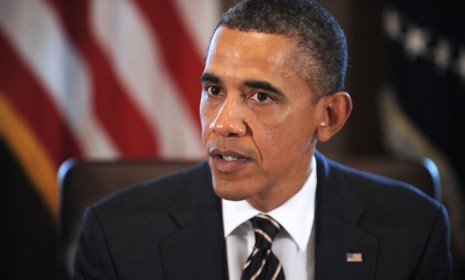'I don't bluff': 3 explanations for Obama's tough talk on Iran
Days before a highly anticipated summit with Israel's prime minister, Obama vehemently insists that he's serious about preventing Tehran from acquiring nukes

A free daily email with the biggest news stories of the day – and the best features from TheWeek.com
You are now subscribed
Your newsletter sign-up was successful
When it comes to destroying Iran's nuclear program, President Obama says all options, including military force, are on the table. "I don't bluff," he tells The Atlantic. "When the United States says it is unacceptable for Iran to have a nuclear weapon, we mean what we say." Obama's comments constitute "the most direct threat he has issued during months of escalating tension" between Iran and the U.S., says Anne Gernan at the Associated Press. And the tough talk comes just as Obama is about to host Israeli Prime Minister Benjamin Netanyahu at the White House Monday. What exactly is motivating Obama's hawkish tone? Here, three theories:
1. He needs to emphasize that he has Israel's back
Obama's critics constantly claim that he is a lousy friend to Israel, and even some of his Democratic "supporters are concerned about" his commitment to the U.S.'s longtime ally, says Christi Parons at the Los Angeles Times. That's why Obama made a point of saying he "has Israel's back." Americans "instinctively sympathize with Israel," the president said. So "why is that despite me never failing to support Israel on every single problem that they've had over the last three years, that there are still questions about that?"
The Week
Escape your echo chamber. Get the facts behind the news, plus analysis from multiple perspectives.

Sign up for The Week's Free Newsletters
From our morning news briefing to a weekly Good News Newsletter, get the best of The Week delivered directly to your inbox.
From our morning news briefing to a weekly Good News Newsletter, get the best of The Week delivered directly to your inbox.
2. But he also wants Israel to back off Iran
Israeli officials have been hinting at a pre-emptive strike against Iranian nuclear facilities for weeks. The White House has long appeared reluctant about backing such a military operation, leaving Obama with the challenge of delivering "two competing messages," says Ethan Bronner in The New York Times. He must join Israel in "warning Iran to abandon its nuclear program or face military action," while also convincing Israel to allow newly imposed sanctions to take effect before launching a strike. In his interview with The Atlantic, Obama seemed not only to support Israel, but to pressure them too, talking up the sanctions by saying they had put Iran "in a world of hurt," and might lead Tehran to reconsider its nuclear program out of "strategic calculation."
3. GOP presidential candidates are dragging Obama right
The contest for the GOP presidential nomination is having a growing impact on Obama's foreign policy, with the candidates assailing him for supposedly being weak-kneed in the face of the Iranian threat. Because of that, the president almost has to sound hawkish. "Obama cannot afford to be too tough on Netanyahu, with Republican presidential candidates ready to pounce on any sign of a rift" between the two leaders, write Matt Spetalnick and Jeffrey Heller at Reuters. The constraints of the November election leave Obama "with somewhat less room to maneuver than he would have at another moment in his presidency," says Bronner.
A free daily email with the biggest news stories of the day – and the best features from TheWeek.com
-
 Democrats push for ICE accountability
Democrats push for ICE accountabilityFeature U.S. citizens shot and violently detained by immigration agents testify at Capitol Hill hearing
-
 The price of sporting glory
The price of sporting gloryFeature The Milan-Cortina Winter Olympics kicked off this week. Will Italy regret playing host?
-
 Fulton County: A dress rehearsal for election theft?
Fulton County: A dress rehearsal for election theft?Feature Director of National Intelligence Tulsi Gabbard is Trump's de facto ‘voter fraud’ czar
-
 The billionaires’ wealth tax: a catastrophe for California?
The billionaires’ wealth tax: a catastrophe for California?Talking Point Peter Thiel and Larry Page preparing to change state residency
-
 Bari Weiss’ ‘60 Minutes’ scandal is about more than one report
Bari Weiss’ ‘60 Minutes’ scandal is about more than one reportIN THE SPOTLIGHT By blocking an approved segment on a controversial prison holding US deportees in El Salvador, the editor-in-chief of CBS News has become the main story
-
 Has Zohran Mamdani shown the Democrats how to win again?
Has Zohran Mamdani shown the Democrats how to win again?Today’s Big Question New York City mayoral election touted as victory for left-wing populists but moderate centrist wins elsewhere present more complex path for Democratic Party
-
 Millions turn out for anti-Trump ‘No Kings’ rallies
Millions turn out for anti-Trump ‘No Kings’ ralliesSpeed Read An estimated 7 million people participated, 2 million more than at the first ‘No Kings’ protest in June
-
 Ghislaine Maxwell: angling for a Trump pardon
Ghislaine Maxwell: angling for a Trump pardonTalking Point Convicted sex trafficker's testimony could shed new light on president's links to Jeffrey Epstein
-
 The last words and final moments of 40 presidents
The last words and final moments of 40 presidentsThe Explainer Some are eloquent quotes worthy of the holders of the highest office in the nation, and others... aren't
-
 The JFK files: the truth at last?
The JFK files: the truth at last?In The Spotlight More than 64,000 previously classified documents relating the 1963 assassination of John F. Kennedy have been released by the Trump administration
-
 'Seriously, not literally': how should the world take Donald Trump?
'Seriously, not literally': how should the world take Donald Trump?Today's big question White House rhetoric and reality look likely to become increasingly blurred